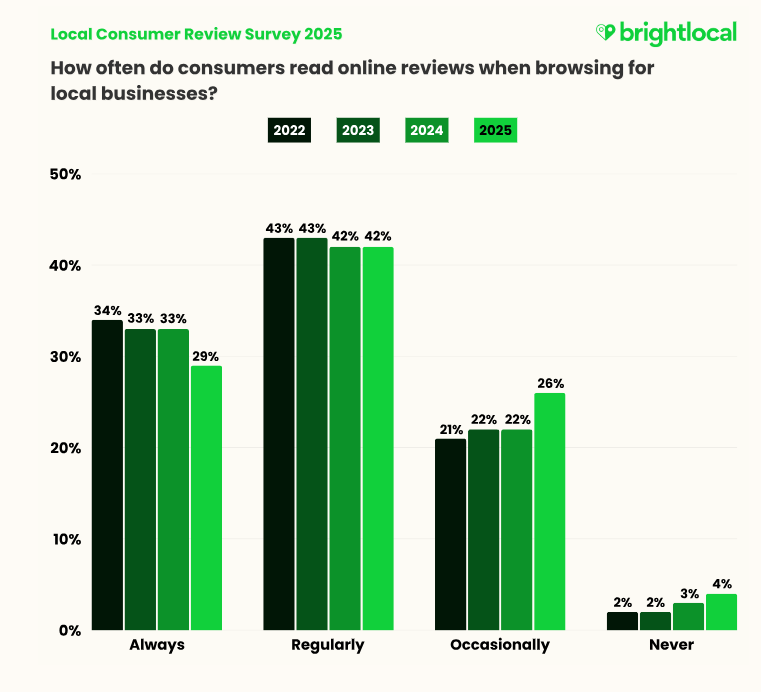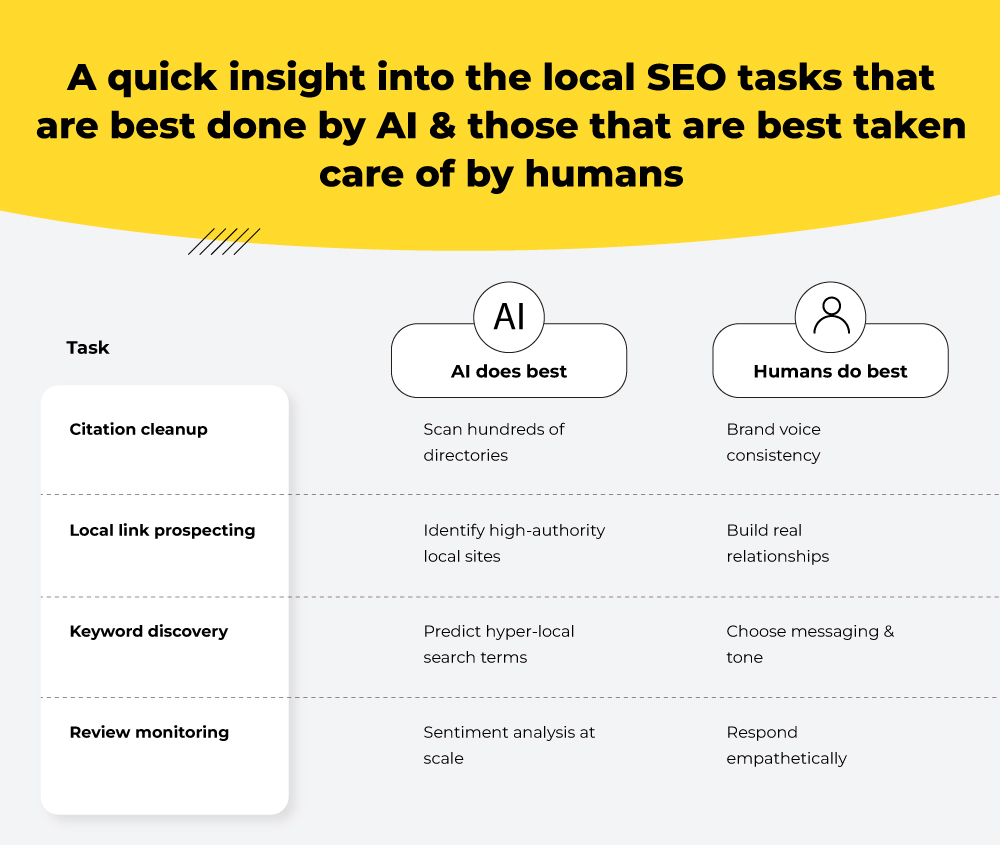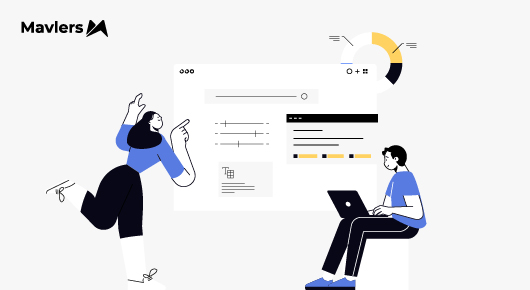Fellow SEO professionals and marketers, may we request you to kindly pull up a chair, grab your coffee, and let’s be brutally honest for a second: Local SEO has always been a grind.
Between juggling citations, chasing reviews, building links few want to give, and decoding Google’s never-ending algorithm tweaks, it can feel like running on a treadmill set to “uphill” with no pause button.

Now enter AI.
If you’ve been in SEO for a while, I bet you’ve already asked yourself these questions:
- Is AI really changing local SEO, or is it just another overhyped buzzword?
- Will AI eventually replace the day-to-day work that SEO professionals do, or does it just make us more efficient?
- And most importantly, how can I effectively utilize AI in local SEO without compromising my results or wasting my time?
You’re not alone. These are the exact questions keeping SEOs and marketers awake at night (along with whether Google will roll out another surprise “helpful content” update at 3 AM).
Here’s the good news: AI in local SEO isn’t about losing control; it’s about taking control. If used strategically, AI can simplify the complex aspects of local search, help you focus on strategy over manual tasks, and actually enhance how businesses appear to local customers.
With our rich repertoire of over 13 years of expertise in the organic search vertical, we are well-positioned to unpack this.
We’ll cover where AI fits in local SEO, where it doesn’t, the real-world tools worth your time, and how to balance machine efficiency with human creativity. By the end, you’ll know exactly how to maneuver AI in local SEO to your benefit, not your replacement.
Getting into geek speak ~ Why AI matters in local SEO (Right now, not 5 years from now!)
Here’s the reality check: Local SEO isn’t getting easier.
- 46% of all Google searches have local intent.
- In India, search interest in ‘open now near me’ has grown over 1.6× year-over-year, showing just how much users expect immediacy in local search.
- According to BrightLocal’s Local Consumer Review Survey, 42% of consumers regularly read online reviews for local businesses.

That’s an enormous amount of competition in the local pack and Maps results.
And here’s the kicker: Google’s local search algorithm in AI is evolving just as fast as user behavior.
Coming to think of it, Google isn’t just looking at NAP consistency or backlinks anymore. It’s factoring in user behavior, real-time context, personalization, and even predictive engagement signals. That’s where AI tools give you an edge; they help you process and optimize against ranking factors that humans can’t manually monitor at scale.
Decoding the role of AI in Google Business Profile (GBP) optimization
One of the most competitive areas for local SEO is your Google Business Profile (GBP).
AI in Google Business Profile optimization is already proving to be quite the game-changer.
Instead of manually testing different categories, product posts, or Q&A responses, AI tools can analyze competitor profiles, identify missing attributes, and even recommend optimizations that align with local intent.
For example, AI-powered platforms can track which business attributes (such as “family-friendly” or “wheelchair accessible”) competitors are ranking for and alert you to gaps in your profile. Others can generate optimized GBP posts or suggest the best times to publish them for maximum visibility.
That’s hours of guesswork saved and a stronger shot at the local pack.
In case you are unfamiliar with the local pack, here’s a simple explanation. It’s the little box of 3 business listings that appears at the top of Google search results when someone searches with local intent.
For instance, if you type “dentist near me”, you’ll usually see a map and three highlighted businesses with their names, ratings, hours, and phone numbers. That’s the local pack.
AI-driven local keyword research
Keyword research has always been messy in local SEO. Search volumes are low, intent is hyper-specific, and Google Keyword Planner isn’t exactly generous with long-tail local data.
Here’s where AI-driven local keyword research steps in.
Instead of just spitting out “plumber near me,” modern AI tools can:
- Predict hyper-local variations (“24/7 emergency plumber in Austin” vs. “Austin clogged drain repair”).
- Identify search patterns based on real-time queries.
- Suggest content ideas that match both local intent and semantic relevance.
And the beauty? These tools don’t stop at keywords. They give you the why behind the query, what users actually want, so you can craft pages that connect rather than just rank.
Leveraging AI for local citation management
Ok, raise your hand if you’ve ever spent a weekend wrangling inconsistent citations. 🙋
Honestly, citation cleanup is one of the least glamorous (but most necessary) parts of local SEO. The good news is that AI now makes it much less painful.
Platforms using AI for local citation management can scan hundreds of directories at scale, flag inconsistencies, and even auto-correct them. Instead of slogging through spreadsheets, you get real-time alerts and dashboards showing exactly where your NAP data is broken.
That means more consistency, less manual work, and a stronger foundation for local rankings.
Deploying AI for local link-building
To call a spade a spade, local link building has always been a challenging task. You’re not trying to get a backlink from Forbes; you’re trying to get mentioned on the local chamber of commerce site or the neighborhood food blog.
Here’s where AI for local link building makes a difference:
- It can scan and identify high-authority, locally relevant sites you may not have considered.
- It can predict which partnerships or sponsorships might deliver the best ROI.
- It can even flag patterns in competitor link profiles that you can replicate.
Of course, AI won’t send the outreach email for you (and if it does, please ensure it doesn’t sound like a robot). The relationship-building is still on us humans. But AI helps you start with a cleaner hit list.
Where the purview of AI ends and humans still shine
Now, let’s get real. AI isn’t here to replace SEOs; it’s here to augment us. Think of it as your 24/7 research assistant, the one that crunches data, scans directories, analyzes reviews, and predicts search intent before you’ve even had your second sip of coffee.
But machines don’t feel. They fail to grasp the subtlety of human messaging, cultural nuance, and empathy in customer interactions. That’s where we come in.
Here’s a quick breakdown of who does what best:

This division of labor is why AI in local SEO is not about replacement, but partnership. So, let AI handle the grunt work, as you bring the spark that only humans can add!
Local SEO tools with AI that actually help
The internet is drowning in “AI tools” right now. Some promise the moon, others don’t even get you off the ground. But when it comes to AI in local SEO, a few categories really do deliver and can save you hours of grunt work.
~ Citation cleanup: Tools like Yext or BrightLocal scan dozens of directories and fix NAP mess-ups while you sleep.
~ Review monitoring: Podium or Birdeye uses AI to spot patterns in reviews (what people love, what they hate) so you can respond faster.
~ Content optimization: Surfer SEO and Clearscope suggest hyper-local keywords and structure to make your content feel natural and improve its ranking. On that note, you might want to read Surfer SEO Review 2025: Pros, Cons, and Real User Insights.
~ Link prospecting: Ahrefs and BuzzStream use AI to surface hidden local link opportunities, while you bring the human touch for outreach.
Understanding local search in AI: Algorithms and beyond
Let’s get a bit technical for a second. When discussing local search in AI, we often refer to how machine learning models are reshaping the ranking signals.
Some types of local search algorithms in artificial intelligence focus on:
- Heuristic search (fast solutions for citation and link discovery).
- Genetic algorithms (used in predictive keyword and intent modeling).
- Simulated annealing (optimizing large data sets like reviews and competitor insights).
While we don’t need to code these ourselves, understanding how AI-driven local search algorithms work helps us comprehend why Google prioritizes certain signals and how tools make their recommendations.
AI for small business SEO: Leveling the playing field
Here’s something we love about AI: it levels the playing field for small businesses.
Big brands used to dominate local SEO because they had the budget to hire agencies, invest in tools, and build content teams. But with AI for small business SEO, even a mom-and-pop pizza shop can:
~ Optimize their Google Business Profile with AI-generated content.
~ Track reviews in real time and respond faster.
~ Identify hyper-local keyword opportunities without a full-time SEO analyst.
The takeaway is that AI isn’t just for enterprise; it’s making local SEO more accessible for businesses of all sizes.
Gazing into the crystal ball ~ Predicting the future of AI for local SEO factors
So where’s this all heading? One may expect Google to continue integrating AI more deeply into its local SEO ranking factors. We’re already seeing signs:
- AI-powered personalization in Maps results.
- Voice search is driving hyper-local queries.
- Predictive engagement signals (clicks, dwell time, and even offline visits).
If we want to stay ahead, we need to think beyond “traditional” ranking factors and start preparing for behavior-driven, AI-influenced signals.
The road ahead
If you need help with your local SEO and are considering partnering with Mavlers, reading “What is Mavlers’ approach to local SEO?” might be helpful. On the other hand, if you’d rather tackle the task yourself, here is another detailed read that will help you ~ The Ultimate Guide to Overcoming Local SEO Challenges and Owning Your Local Market.



Darshan Modi - Reviewer
Darshan is the Director of Digital Marketing at Mavlers with 12+ years of experience driving performance-focused strategies for global agencies and direct brands. He specializes in AI-powered Organic Search, Interest Generation campaigns, Performance Max campaigns, Meta Advantage+, and data-driven paid media strategies that deliver measurable ROI. Passionate about integrating AI and automation, Darshan has helped brands across the USA, UK, Canada, Australia, and Europe scale their digital campaigns and optimize conversions. He also consults on GA4, attribution modeling, and conversion tracking to align marketing with real business impact.
Naina Sandhir - Content Writer
A content writer at Mavlers, Naina pens quirky, inimitable, and damn relatable content after an in-depth and critical dissection of the topic in question. When not hiking across the Himalayas, she can be found buried in a book with spectacles dangling off her nose!
Managing Klaviyo customer preferences: Why they matter, strategy, & industry-specific preference lists
Top 10 WordPress Development Trends to Follow in 2025